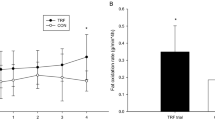Abstract
Objective: To test whether isoenergetic isoenergetically-dense doses of dietary 1-monoglyceride or triglyceride differentially influence appetite and meal-to-meal energy intake in man.
Design: Six men and six women were each studied twice in a 2 d protocol. On day 1 (maintenance day) they were fed a medium fat (MF) maintenance diet (MF: 40% fat, 47% carbohydrate and 13% protein by energy) calculated at 1.6×resting metabolic rate (RMR). On day 2 (manipulation day) at 08.30 h subjects consumed a high-fat breakfast designed to contain 80–85% of RMR, composition 10% protein, 56% fat and 34% carbohydrate by energy, with 65% of energy for fat derived as either 1-monoglyceride or triglyceride. Food and energy intake were monitored at lunch (given at 12.30 pm) and throughout the remainder of the day. During this time subjects had ad libitum access to isoenergetic, isoenergetically dense MF (40∶47∶13) foods (550 kJ/100 g), until 22.30 pm). Subjective hunger and satiety were tracked hourly, during waking hours.
Results: There was no significant effect of fat type on food or energy intake at lunch or during the ad libitum period. There was no diet effect on subjective hunger (F(1, 10) 0.00; P=0.975) in the inter-meal periods of morning or afternoon, nor during the whole day. Subjects found both diets to be similarly pleasant (F(1, 61) 0.84; P=0.364). Men and women responded similarly, except that men ate more on all occasions than women.
Conclusions: This study suggests that when a large dose of 1-monoglyceride or triglyceride is incorporated into a breakfast meal, it behaves in a manner that is very similar to triglyceride in terms of the effects on hunger, appetite or feeding behaviour.
Sponsorship: This work was supported by the Scottish Office Agriculture, Environment and Fisheries Department.
This is a preview of subscription content, access via your institution
Access options
Subscribe to this journal
Receive 12 print issues and online access
$259.00 per year
only $21.58 per issue
Buy this article
- Purchase on Springer Link
- Instant access to full article PDF
Prices may be subject to local taxes which are calculated during checkout
Similar content being viewed by others
Author information
Authors and Affiliations
Rights and permissions
About this article
Cite this article
Johnstone, A., Ryan, L., Reid, C. et al. Breakfasts high in monoglyceride or triglyceride: no differential effect on appetite or energy intake. Eur J Clin Nutr 52, 603–609 (1998). https://doi.org/10.1038/sj.ejcn.1600614
Received:
Revised:
Accepted:
Published:
Issue Date:
DOI: https://doi.org/10.1038/sj.ejcn.1600614



